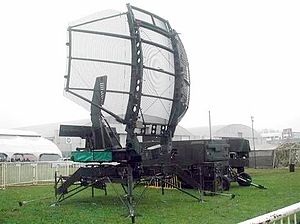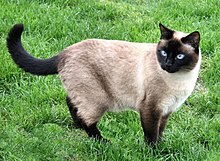| Revision as of 00:22, 4 April 2017 view sourceHuntster (talk | contribs)Administrators47,429 edits Cat-a-lot: Moving from Category:Equipment of the United States Air Force to Category:Radars of the United States Air Force← Previous edit | Revision as of 19:58, 16 April 2017 view source FRANCOBOLI (talk | contribs)12 editsNo edit summaryNext edit → | ||
| Line 11: | Line 11: | ||
| The entire system can be broken down and packed into two ] for road transport. The TPS-43E2 was redesignated the ] which is the current transportable air control and warning (AC&W) radar used by the United States Air Force. | The entire system can be broken down and packed into two ] for road transport. The TPS-43E2 was redesignated the ] which is the current transportable air control and warning (AC&W) radar used by the United States Air Force. | ||
| ''Italic text'' | |||
| ] | |||
| == Variants == | == Variants == | ||
| In addition to the basic TPS-43 several variants were developed.<ref>{{cite web|url=http://www.mobileradar.org/radar_descptn_3.html|title=radar_descptn_3|work=mobileradar.org}}</ref> | In addition to the basic TPS-43 several variants were developed.<ref>{{cite web|url=http://www.mobileradar.org/radar_descptn_3.html|title=radar_descptn_3|work=mobileradar.org}}</ref> | ||
| ] | |||
| * TPS-43A (antenna tilt; new IFF) | * TPS-43A (antenna tilt; new IFF) | ||
| * TPS-43B (enlarged shelter; changes to transmitter) | * TPS-43B (enlarged shelter; changes to transmitter) | ||
| Line 31: | Line 32: | ||
| This radar was deployed by the ] during the 1982 ] to ] and survived two British attacks with ] anti radar missiles on May 31 and June 3.<ref>''Vulcan: God of Fire'', p.(TBC), The History Press (2012).</ref> One of the radars was captured by British forces after the Argentine surrender and deployed at ]<ref>{{cite web|url=http://www.subbrit.org.uk/rsg/sites/b/buchan|title=Subbrit:RSG: Sites: RAF Buchan: (former , ROTOR R3 GCI Radar Station 'GBU')|work=subbrit.org.uk}}</ref> Another set installed at ], in the mainland, was used to guide Argentine attacks on the British fleet.<ref>''Exocet Falklands: The Untold Story of Special Forces Operations'', p.82, Pen and Sword (2014).</ref> | This radar was deployed by the ] during the 1982 ] to ] and survived two British attacks with ] anti radar missiles on May 31 and June 3.<ref>''Vulcan: God of Fire'', p.(TBC), The History Press (2012).</ref> One of the radars was captured by British forces after the Argentine surrender and deployed at ]<ref>{{cite web|url=http://www.subbrit.org.uk/rsg/sites/b/buchan|title=Subbrit:RSG: Sites: RAF Buchan: (former , ROTOR R3 GCI Radar Station 'GBU')|work=subbrit.org.uk}}</ref> Another set installed at ], in the mainland, was used to guide Argentine attacks on the British fleet.<ref>''Exocet Falklands: The Untold Story of Special Forces Operations'', p.82, Pen and Sword (2014).</ref> | ||
| ] | |||
| == Users == | == Users == | ||
| {{expand section|date=January 2015}} | {{expand section|date=January 2015}} | ||
| Line 49: | Line 50: | ||
| * Maximum display range: 450 km <ref>{{cite web|url=http://www.radartutorial.eu/19.kartei/karte804.en.html|title=Radar Basics|work=radartutorial.eu}}</ref> | * Maximum display range: 450 km <ref>{{cite web|url=http://www.radartutorial.eu/19.kartei/karte804.en.html|title=Radar Basics|work=radartutorial.eu}}</ref> | ||
| * Antenna characteristics: Reflector aperture 14 ft (4.27 m) high by 20 ft 4 in (6.20 m) wide | * Antenna characteristics: Reflector aperture 14 ft (4.27 m) high by 20 ft 4 in (6.20 m) wide | ||
| ] | |||
| == See also == | == See also == | ||
| {{Portal|United States Air Force}} | {{Portal|United States Air Force}} | ||
| Line 64: | Line 65: | ||
| ===Notes=== | ===Notes=== | ||
| {{reflist}} | {{reflist}} | ||
| ] | |||
| ===Sources=== | ===Sources=== | ||
| * | * | ||
Revision as of 19:58, 16 April 2017

The AN/TPS-43 is a transportable 3-dimensional air search radar produced in the United States originally by Westinghouse Defense and Electronic Division, which was later purchased by Northrop-Grumman.
Description
| This section needs expansion. You can help by making an edit requestadding to it . (January 2015) |
The AN/TPS-43 is a ground-based, non-fixed (i.e.: transportable) search radar.
The entire system can be broken down and packed into two M35 trucks for road transport. The TPS-43E2 was redesignated the AN/TPS-75 which is the current transportable air control and warning (AC&W) radar used by the United States Air Force. Italic text

Variants
In addition to the basic TPS-43 several variants were developed.

- TPS-43A (antenna tilt; new IFF)
- TPS-43B (enlarged shelter; changes to transmitter)
- TPS-43C / 43CX (increased reliability; IFF improvements)
- TPS-43D / 43DX (ISLS added; maximum detection range increased)
- TPS-43E (major redesign; improvements to electronics, mechanics and shelter)
- TPS-43F / subvariants V1 to V6 (major redesign; enlarged shelter, improved electronics; increased reliability)
- TPS-43G
- TPS-43M (improved electronics; increased dynamic range; improved IFF incorporating several modules in a single unit)
- TPS-430
Operational History
| This section needs expansion. You can help by making an edit requestadding to it . (January 2015) |
The AN/TPS-43 completed development in 1963 and entered US service in 1968.
This radar was deployed by the Argentine Air Force during the 1982 Falklands War to Stanley and survived two British attacks with AGM-45 Shrike anti radar missiles on May 31 and June 3. One of the radars was captured by British forces after the Argentine surrender and deployed at RAF Buchan Another set installed at Rio Grande, in the mainland, was used to guide Argentine attacks on the British fleet.

Users
| This section needs expansion. You can help by making an edit requestadding to it . (January 2015) |
 Argentina - Argentine Air Force - In the early 1980s six sets were purchased, one was lost in the Falklands War.
Argentina - Argentine Air Force - In the early 1980s six sets were purchased, one was lost in the Falklands War.
Specifications
- Weight (including shelter): < 3400 kg
- Frequency range: 2.9 to 3.1 GHz (S-Band)
- Pulse repetition frequency: Fixed: 250 Hz, Staggered: Six PRF's around 250 Hz
- Pulse width: 6.5 microseconds
- Peak power: 4.0 MW
- Average power: 6.7 KW
- Beam width (horizontal): 1.1 degrees
- Beam width (vertical): 1.5 to 8.1 degrees; total 20 degree coverage; six stacked beams
- Antenna rotation rate: 6 rpm
- Maximum display range: 450 km
- Antenna characteristics: Reflector aperture 14 ft (4.27 m) high by 20 ft 4 in (6.20 m) wide

See also
Footnotes
- The US Military description for radar type TPS is "Ground, Transportable; Radar; Detecting, Range and Bearing, Search".
References
Notes
- "radar_types". mobileradar.org.
- "radar_descptn_3". mobileradar.org.
- Vulcan: God of Fire, p.(TBC), The History Press (2012).
- "Subbrit:RSG: Sites: RAF Buchan: (former , ROTOR R3 GCI Radar Station 'GBU')". subbrit.org.uk.
- Exocet Falklands: The Untold Story of Special Forces Operations, p.82, Pen and Sword (2014).
- Medio siglo de gastos para la Defensa y la Seguridad en Argentina (1976-2006)- 2da. Parte Centro de Estudios Nueva Mayoría (2007) (accessed 2015-01-02)
- "Radar Basics". radartutorial.eu.

Sources
- radartutorial.eu Card Index of Radar Sets - Ancient Radars – AN/TPS-43
- Mobile Military Radar website, Radar descriptions page, AN/TPS-43 details (accessed 2015-01-02)
- Osacar, Ignacio J. (5 June 2007). "Medio siglo de gastos para la Defensa y la Seguridad en Argentina (1976-2006)- 2da. Parte". NuevaMayoria.com (in Spanish). Buenos Aires, Argentina: Centro de Estudios Nueva Mayoría. Retrieved 2 January 2015.
- Southby-Tailyour, Ewen (2014). Exocet Falklands: The Untold Story of Special Forces Operations. Pen and Sword. ISBN 9781783463879. Retrieved 3 January 2015.
- McLelland, Tim (2012). Vulcan: God of Fire. The History Press. ISBN 9780752476957. Retrieved 4 January 2015.
External links
- "Armamento - Material Terrestre - Sistema de Radares Westinghouse AN-TPS43 y W-430". Fuerza Aérea Argentina (sitio oficial) (in Spanish). Buenos Aires, Argentina: Fuerza Aérea Argentina (Argentine Air Force). Retrieved 6 January 2015.